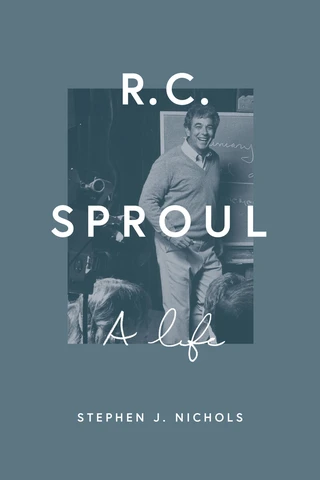
Stephen J. Nichols
Reviewed by: David M. Sarafolean
R. C. Sproul: A Life, by Stephen J. Nichols. Crossway, 2021. Hardcover, 400 pages, $26.99 (Amazon). Reviewed by OP pastor David M. Sarafolean.
R. C. Sproul: A Life is a delightful story of how God raised up a kid from Pittsburgh, Pennsylvania, and made him an ambassador of the gospel whose life touched millions around the globe. Stephen Nichols does a masterful job explaining Sproul’s rise to professor, theologian, prolific author, pastor, and chairman of Ligonier Ministries. Much of the book is based on personal interviews that Nichols conducted with both R. C. and his wife, Vesta. Sproul died in December 2017 at the age of seventy-eight.
Sproul’s path to becoming a theologian is fascinating. His parents were both believers, but the family found itself attending a Presbyterian Church that was rather liberal. Sproul attended Westminster College just north of Pittsburgh on an athletic scholarship. Sproul came to faith early in his freshman year. There he was mentored by Dr. Thomas Gregory, who “was an island in a sea” of liberalism (59). Gregory was a graduate of Westminster Theological Seminary in Philadelphia and the only theological conservative on the college faculty. Through the influence of Gregory, Sproul changed his major from history to religion, and later changed it again to philosophy.
Upon graduation, Sproul found himself at Pittsburgh Theological Seminary where he studied under John Gerstner, who became his close friend and mentor. Gerstner was the only theological conservative at Pittsburgh, and it was under his influence that Sproul blossomed. With guidance from Gerstner, Sproul pursued a PhD at the Free University of Amsterdam where he studied under G. C. Berkouwer.
The book also chronicles Sproul’s work facing major issues affecting the church. For instance, in 1973, Sproul convened the first major council on the topic of biblical inerrancy, The Conference on the Inspiration and Authority of Scripture, held at Ligonier. Participants included J. I. Packer, John Warwick Montgomery, John Gerstner, Sproul, and others. In 1977, he was invited to participate in the International Council on Biblical Inerrancy, where he served as president and James Montgomery Boice served as chairman. The council convened in the fall of 1978 in Chicago. In 1994, Sproul led opposition to “Evangelicals and Catholics Together” (First Things, May 1994), a document signed by a number of evangelical leaders like J. I. Packer, Chuck Colson, and others, purportedly agreeing with Roman Catholics on a number of sticky theological issues. At stake were core doctrines like justification by faith alone and the imputation of Christ’s righteousness to the believer.
If we wish to trace the rise of Reformed theology in the evangelical church over the last thirty years, we need look no further than R. C. Sproul. Through his influence, untold millions of people have been exposed to the truths of the Protestant Reformation and the doctrines found in the Westminster Confession of Faith and its catechisms. As someone touched by Sproul’s ministry, my heart was warmed by reading this biography. He was my introduction to Reformed theology, and, through his influence, God moved me out of parachurch ministry to ministry as a pastor, now serving in the OPC.
November 16, 2025
November 09, 2025
November 02, 2025
October 26, 2025
October 19, 2025
October 05, 2025
Raising Sexually Faithful Kids and
Parenting Boys and Girls in a Gender-Confused World
September 28, 2025
© 2025 The Orthodox Presbyterian Church